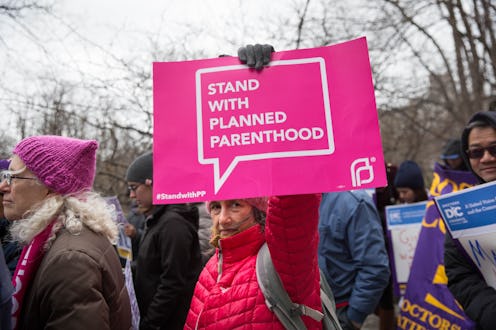News
Why Defunding Title X Isn't Just A "Woman's Problem"

For those who thought Planned Parenthood was out of Donald Trump's target range when the GOP plan to replace Obamacare — and with it, defund Planned Parenthood — failed, Thursday proved otherwise. The president took a significant step toward denying government funds to Planned Parenthood and other groups that provide abortion services. Trump signed a bill targeting Title X funding, which helps streamline the possibility of states defunding Planned Parenthood. Reproductive rights experts fear that such a move will hurt not only women, but also American communities at large.
In his last days before leaving the oval office, Obama implemented a law related to Title X funding. As the Department of Health and Human Services states, Title X is a "federal grant program dedicated solely to providing individuals with comprehensive family planning and related preventive health services." Obama's rule made it so that states could not pass laws to specifically target and withhold federal funding from Planned Parenthood or other clinics that provide abortions.
There is an important nuance to take into account. As with all government funds, Title X funding itself doesn't go towards abortion services, so none of the government money protected by Obama's rule was for abortions in any case. Instead, the funding from the federal Title X program directly benefits low-income families and uninsured patients by providing patients with accessible birth control options, HIV screenings, Pap Smears, cancer screenings and regular check-ups.
Ironically, although Republicans' ultimate aim in defunding Planned Parenthood may be to reduce the number of abortions, that won't necessarily be the outcome. In fact, Sydney Casey, a healthcare associate working at a Planned Parenthood in New York, tells Bustle that stripping Title X funds would potentially increase abortions.
When our culture makes family planning and healthcare available, it prevents reproductive coercion and promotes bodily autonomy. Title X offers that bodily autonomy to some of the most vulnerable among us.
"Since Title X doesn't cover abortion, it's my belief that without Title X funding or Medicaid coverage, we would see an increase in abortion needs. Family planning programs help our patients who want to avoid having an unplanned pregnancy do just that," Casey says.
And despite the GOP's focus on abortion, which miscasts Planned Parenthood as a resource only for women (among other misconceptions), the health service organization sees a wide range of patients who would be hurt by the loss of funds. Casey writes:
"Planned Parenthood sees transgender and non-binary patients who need contraception and menstruation management as well, and of course, when people have access to family planning resources — they use them to make the best decisions for their families."
When one takes a more holistic perspective, argues Casey, it's even clearer how Title X funding benefits American families overall. "When people can plan their families, we all benefit — not just our partners or children," she writes. "When our culture makes family planning and healthcare available, it prevents reproductive coercion and promotes bodily autonomy. Title X offers that bodily autonomy to some of the most vulnerable among us."
Melanie Hampton of Seattle tells Bustle over email how she benefited firsthand from Title X.
"I got pregnant really quickly after I got married, and it was unplanned and very financially stressful," says Hampton. "I also got pregnant when insurance was still allowed to not cover pregnancy (pre-ACA), so being able to get an IUD for free after my daughter was born was incredible. There was a time when we couldn't even pay for the parking at our daughter's pediatrician. How could we have afforded a $900 IUD?!"
For Hampton, the importance of Title X funding reverberates far beyond the health of women.
"When women are able to choose if and when to have a healthy, wanted pregnancy and birth, that directly affects not only the health of that woman and her immediate family, but her community at large," she says.
Thus, it's not just women but entire families and communities that could bear the ramifications of Trump's latest move.